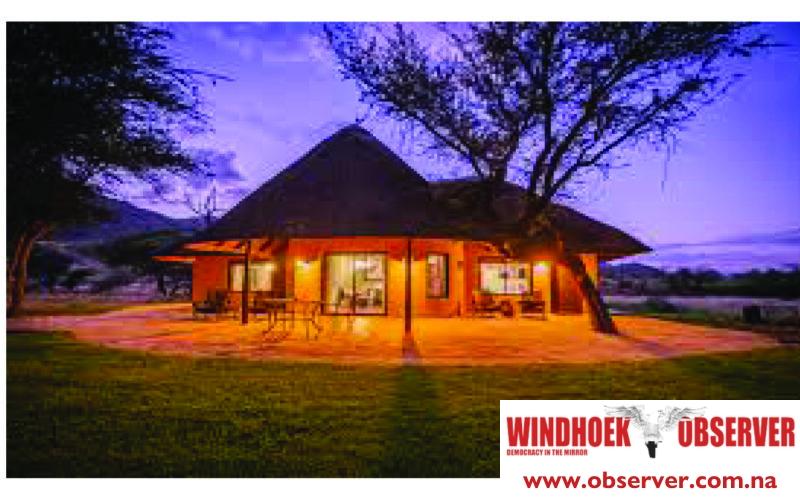Fifteen minutes north of Windhoek’s city limit, the beat of urban life softens into savanna. Kalahari thorn trees punctuate golden grass, kudus watch from the treeline, and the sky pulls its favourite Namibian trick—an endless, impossible blue. This is Gondwana’s Okapuka Lodge: a safari lodge that sits close enough for a spontaneous day trip, yet vast enough to remind you why people fly across oceans to be here. For young professionals juggling deadlines and dreams, Okapuka offers a rare combination: restorative nature you can access between breakfast and a 3pm Zoom call, plus a gentle nudge into a slower, more textured way of being.
Let’s start with the approach. You leave the B1 behind, and in minutes you’re on a well-kept gravel road, the landscape widening with each kilometre. Arriving at the lodge, the architecture leans into nostalgia: thatched roofs, warm stone, and broad verandas that invite notebooks and unhurried conversations. The staff practice a style of hospitality that feels both contemporary and rooted in Namibian warmth – direct, efficient, and quietly generous. If you came for a nature drive, the timing is everything: early morning for shy grazers, late afternoon for the theatre of light that makes photographers sentimental.
Game viewing at Okapuka is honest rather than theatrical. You’re on the edge of the Khomas Hochland biome, with a cast of characters that includes giraffe, impala, oryx, wildebeest, zebra, warthog, ostrich, sable and eland, with white rhino sometimes gracing the valley like quiet elders. This is not Etosha’s salt-pan spectacle; it’s intimate encounters at close range, where you notice how a giraffe chews, how warthogs kneel, and how the wind changes everything. If you’re a first-timer, sit behind the guide and watch how they read the land through dung, tracks, alarm calls, and the angle of the sun. The savanna has grammar.
For day visitors, the lodge rhythm is simple: arrive with a booking, check in at reception, take a slow drink on the terrace, then join your scheduled activity. The afternoon game drive is a favourite for a reason: the light turns liquid, and even your phone camera begins to behave like a grown-up. Back at the lodge, Sunday lunch carries local legend, as it is generous, unpretentious and fresh. If you’re using Okapuka as a creative retreat, claim a shady corner with charging access, order coffee and let your brain decompress. Creative output often arrives after quiet input; Okapuka specialises in that.
Accommodation, for those staying over, balances rustic charm with modern convenience. Thatched rooms with en-suite bathrooms and climate control keep you comfortable in Windhoek’s highland weather, and the two pools make midday heat a footnote rather than a plot twist. Wi-Fi is decent near the main areas, which lets you do that awkward hybrid thing: morning lion track, midday email triage, sunset with a book. If you need a reset but can’t take leave, one night at Okapuka can function like a 48-hour therapy session you don’t have to narrate to anyone. You simply return to town less brittle.
One of the best ways to experience Okapuka is with intention. If you’re a photographer, plan a mini project: “Twelve textures of savanna” or “Portraits of patience” featuring guides, cooks, and guests. If you’re a writer, try a field notebook: record five sensory details per hour with smell, light, sound, texture, and taste. If you’re a parent, turn it into an outdoor classroom: teach children how to move quietly, how to scan horizons, and how to name antelope and clouds. The savanna rewards attention with wonder.
Sustainability at a lodge this close to the capital is not a trend; it’s a responsibility. Okapuka’s management footprint includes careful water use, waste separation, and vegetation management to avoid over-browsing. Guests can match that ethic in simple ways: refill bottles, stick to designated roads, keep noise down on drives, and tip fairly (service work is skilled work). For young professionals thinking about building careers in tourism or conservation tech, keep your eyes open for the backstage systems: inventory, kitchen management, vehicle maintenance, and booking flows. Tourism is about logistics more than sunsets; learning how a lodge works is a masterclass in operations.
Okapuka also makes a strong case for micro-adventures. Not every Namibian can take a week to drive to the Kunene or the Zambezi. But you can claim Saturday morning for a near-city safari and still make your afternoon commitments. Pack light: a hat, sunscreen, binocs if you have them, a scarf for dust, water, and a notebook. Wear neutral colours and comfortable shoes. Leave with your battery full, both in your phone and in your life. The next week’s emails will feel less sharp if you’ve watched giraffes calibrate elegance against gravity.
The magic of places like Okapuka is that they remind you of proportion. Your deadlines shrink a little when a kudu stops to regard you without judgement. Your best ideas often arrive when you’re not forcing them. And your relationships breathe more easily when you make space for shared awe. The savanna doesn’t need your hustle; it invites your attention. In a year, you’ll remember two sentences from a report, but you’ll remember the way the horizon looked like a promise.




